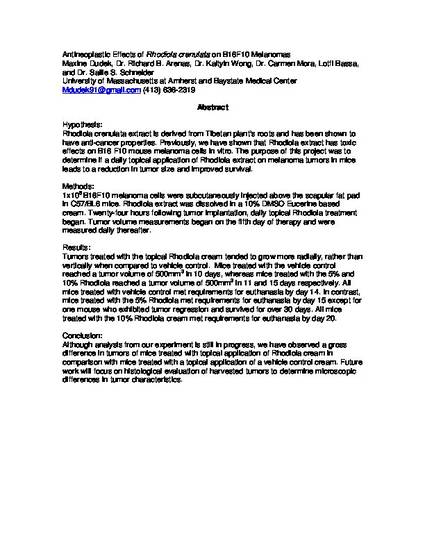
Hypothesis: Rhodiola crenulata extract is derived from Tibetan plant’s roots and has been shown to have anti-cancer properties. Previously, we have shown that Rhodiola extract has toxic effects on B16 F10 mouse melanoma cells in vitro. The purpose of this project was to determine if a daily topical application of Rhodiola extract on melanoma tumors in mice leads to a reduction in tumor size and improved survival.
Methods: 1x106 B16F10 melanoma cells were subcutaneously injected above the scapular fat pad in C57/BL6 mice. Rhodiola extract was dissolved in a 10% DMSO Eucerine based cream. Twenty-four hours following tumor implantation, daily topical Rhodiola treatment began. Tumor volume measurements began on the fifth day of therapy and were measured daily thereafter.
Results: Tumors treated with the topical Rhodiola cream tended to grow more radially, rather than vertically when compared to vehicle control. Mice treated with the vehicle control reached a tumor volume of 500mm3 in 10 days, whereas mice treated with the 5% and 10% Rhodiola reached a tumor volume of 500mm3 in 11 and 15 days respectively. All mice treated with vehicle control met requirements for euthanasia by day 14. In contrast, mice treated with the 5% Rhodiola met requirements for euthanasia by day 15 except for one mouse who exhibited tumor regression and survived for over 30 days. All mice treated with the 10% Rhodiola cream met requirements for euthanasia by day 20.
Conclusion: Although analysis from our experiment is still in progress, we have observed a gross difference in tumors of mice treated with topical application of Rhodiola cream in comparison with mice treated with a topical application of a vehicle control cream. Future work will focus on histological evaluation of harvested tumors to determine microscopic differences in tumor characteristics.
Available at: http://works.bepress.com/richard_arenas/3/

Abstract of poster presented at the 2014 UMass Center for Clinical and Translational Science Research Retreat, held on May 20, 2014 at the University of Massachusetts Medical School, Worcester, Mass.